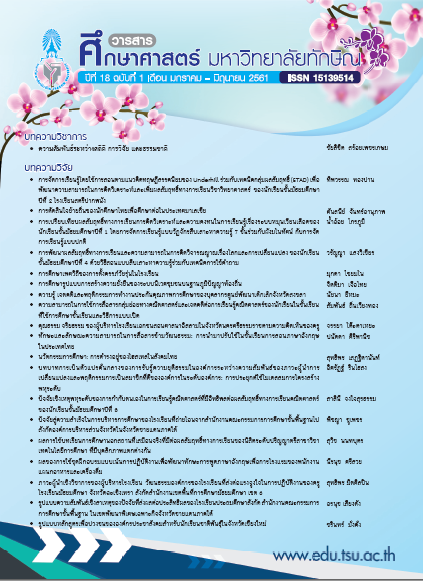รูปแบบความสัมพันธ์เชิงสาเหตุของปัจจัยที่ส่งผลต่อประสิทธิผลของโรงเรียนประถมศึกษาสังกัด สำนักงานคณะกรรมการการศึกษาขั้นพื้นฐาน ในเขตพัฒนาพิเศษเฉพาะกิจจังหวัดชายแดนภาคใต้
Main Article Content
บทคัดย่อ
บทความนี้มีวัตถุประสงค์เพื่อศึกษาภาวะผู้นำ วัฒนธรรมองค์การ สมรรถนะขององค์การ ความผูกพันต่อองค์การและประสิทธิผลของโรงเรียนประถมศึกษาสังกัดสำนักงานคณะกรรมการการศึกษาขั้นพื้นฐานในเขตพัฒนาพิเศษเฉพาะจังหวัดชายแดนภาคใต้ เพื่อศึกษารูปแบบความสัมพันธ์เชิงสาเหตุระหว่าง ภาวะผู้นำ วัฒนธรรมองค์การ สมรรถนะขององค์การ ความผูกพันต่อ องค์การ กับประสิทธิผลของโรงเรียนประถมศึกษาสังกัดสำนักงานคณะกรรมการการศึกษาขั้นพื้นฐานในเขตพัฒนาพิเศษเฉพาะกิจจังหวัดชายแดนภาคใต้ และเพื่อตรวจสอบความสอดคล้องของรูปแบบความสัมพันธ์เชิงสาเหตุประสิทธิผลของโรงเรียนประถมศึกษาสังกัดสำนักงานคณะกรรมการการศึกษาขั้นพื้นฐานในเขตพัฒนาพิเศษเฉพาะกิจจังหวัดชายแดนภาคใต้กับข้อมูลเชิงประจักษ์ ข้อค้นพบว่าการวิจัยคือ 1) โรงเรียนประถมศึกษาสังกัดสำนักงานคณะกรรมการการศึกษาขั้นพื้นฐานในเขตพัฒนาพิเศษเฉพาะกิจจังหวัดชายแดนภาคใต้ มีภาวะผู้นำ วัฒนธรรมองค์การสมรรถนะขององค์การ ความผูกพันต่อองค์การ และประสิทธิผลของโรงเรียนอยู่ในระดับปานกลาง 2) ปัจจัยที่มีผลต่อประสิทธิผลของโรงเรียนมากที่สุดคือ สมรรถนะองค์การ ส่วนปัจจัยที่มีผลต่อประสิทธิผลของโรงเรียนน้อยที่สุด คือ ภาวะผู้นำของผู้บริหารองค์การ และ สมรรถนะขององค์การ วัฒนธรรมองค์การ ความผูกพันต่อองค์การมีอิทธิพลทางตรงต่อประสิทธิผลของโรงเรียนอย่างมีนัยสำคัญทางสถิติ 3) รูปแบบมีความสอดคล้องกับข้อมูลเชิงประจักษ์ ( / df=1.271, GFI=0.983, AGFI=0.964, RMSEA=0.022) รูปแบบความสัมพันธ์เชิงสาเหตุของปัจจัยทั้ง 4 สามารถอธิบายความแปรปรวนประสิทธิผลของโรงเรียนได้ร้อยละ 84
Article Details
ในกรณีที่กองบรรณาธิการ หรือผู้เชี่ยวชาญ ซึ่งได้รับเชิญให้เป็นผู้ตรวจบทความวิจัย หรือ บทความทางวิชาการมีความเห็นว่าควรแก้ไขความบกพร่อง ทางกองบรรณาธิการจะส่งต้นฉบับให้ ผู้เขียนพิจารณาจัดการแก้ไขให้เหมาะสมก่อนที่จะลงพิมพ์ ทั้งนี้ กองบรรณาธิการจะยึดถือความคิด เห็นของผู้เชี่ยวชาญเป็นเกณฑ์
เอกสารอ้างอิง
Foss, N. J. & Knudsen, C. (Eds.). (2013). Towards a competence theory of the firm. Rutledge. San Francisco: Jossey: Bass.
Fullan, Michael. (2000). Leadership for the Twenty-First Century : Breaking the Bonds of Dependency. In The Jossey-Bass Reader on Educational Leadership.San Francisco Jossey-Bass
Hoy, W.K. and Miskel C.G. (2001). Education administration, Theory research and practice. (6th ed.). New York:McGraw-Hill.
Jeynes, W. H. (2007). The Relationship Between Parental Involvement and Urban Secondary School Student Academic Achievement A Meta-Analysis. Urban education.
Kotter, J. P. (1996). Leadering Change. Harvard Business Press.
Lee, J. S. & Bowen, N. K. (2006). Parent involvement, cultural capital, and the achievement gap among elementary school children. American educational research journal.
Ministry of Education. (2015). Report on the results of the educational development project. In the Southern Border Provinces Development Zone Fiscal year2015. Office of Educational Development, Special Administrative Region, Southern Border Provinces Development Office, Office of the Basic Education Commission.
Ministry of Education. (2016). Prime Minister meets teacher friend "Happy to the teacher. Teacher happy to students. " From Policy to Practice. At Challenger Hall 1, IMPACT Muang Thong Thani. Office of Educational Development.
Ministry of Education. (2017). Strategic Plan for Special Education Development in the Southern Border Provinces Development Area 20 Years. (2060-2579). Southern Border Provinces Coordinating and Educational Center
Murphy, J. (1997). Putting New school Leaders to the Test. Education week.
National Institute of Educational Testing Service (Public Organization). (2015). Annual Report 2016. Bangkok: National Institute of Educational Testing Service (Public Organization).
Nguni, Samuel, Sleegers, Peter and Denessen, Eddie. (2006). Transformational and Transactional Leadership Effects on Teachers’ Job Satisfaction, Organizational Commitment, and Organizational Citizenship Behavior in Primary Schools : The Tanzania Case. School Effectiveness and School Improvement. 17
Office of the Basic Education Commission. (2004:319). Legal and Discipline Manual. Bangkok : Printing,Shipping and Packages Authority.
Pecha-re Rouvi chet. (2003). Learning Management Styles: Cross-Cultural Management. Dungkamal publishing house.
Preedy, M. (1993). Managing the effective school. London Paul Chapman Open University. Press.
Ross, John A. & Gray, Peter. (2006). Transformational Leadership and Teacher Commitment to Organizational Value. The Mediating Effects of Collective Teacher Efficacy. School Effectiveness and School Improvement. 17 (2).
Rungsun Uanvichit. (2014). A Causal Model of the Effectiveness of Small-Sized Elementary School. Doctor of Philosophy Program Educational Administration Doctor of Philosophy Program Educational Administration Christian University of Thailand.
Rungchadaporn Wahachad. (2000). Management of basic education institutions. Songkla: Book Centre Thaksin University.
Saris, W. E., & Stronkhorst, L. H. (1984). Causal modeling in non experimental research : An introduction to the LISREL approach (Vol. 3): Stoichiometric Research Foundation Amsterdam.
Simosi, Maria and Xenikou, Althena. (2010). The Role of Organizational Culture in The Relationship Between Leadership and Organizational Commitment: An Empirical Study in a Greek Organization. The International Journal of Human Resource Management.
Somrit Kangpeng. (2000). Administrative Factors Influencing School Effectiveness : Development And the integrity of the model. Education Degree philosophy Educational Administration Branch College.Khonkan University.
Tawatchai Tangutairuang. (2015). A Causal Model of the Effectiveness of Small-Sized Primary Schools under the Office of the Basic Education Commission in the Central Region of Thailand. Doctor of Philosophy Program Educational Administration Doctor of Philosophy Program Educational Administration Christian University of Thailand.
Yousef, Darwish A. (2000). Organizational Commitment: A Mediator of the Relationships of Leadership Behavior with Job Satisfaction and Performance in a Non-Western Country. Journal of Managerial Psychology. 15 (1).
Yuki, G. A. (1989). Leadership in organizations. (7th ed.). New Jersey: Prentice-Hall.
Zehir, Cemal: Acar, Zafer A. and Tanriverdi, Haluk. (2006). Identifying Organizational Capabilities As Predictors of Growth and Business Performance. The Business review, Cambridge. 5 (Summer).


